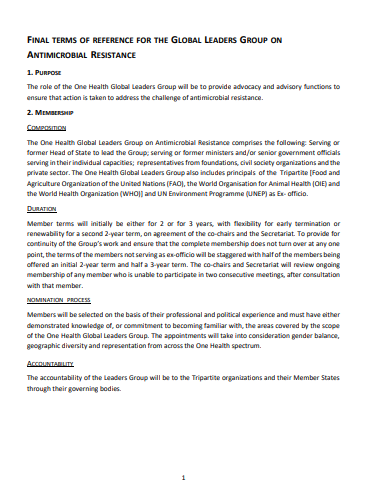Terms of Reference for the Global Leaders Group on Antimicrobial Resistance
Terms of Reference for the Global Leaders Group

Overview
TERMS OF REFERENCE FOR THE GLOBAL LEADERS GROUP ON ANTIMICROBIAL RESISTANCE
1. PURPOSE
The role of the Global Leaders Group on Antimicrobial Resistance will be to provide advocacy and advisory functions to ensure that action is taken to address the challenge of antimicrobial resistance.
2. MEMBERSHIP
The Global Leaders Group on Antimicrobial Resistance comprises the following: Serving or former Head of State to lead the Group; serving or former ministers and/or senior government officials serving in their individual capacities; representatives from foundations, civil society organizations and the private sector. The Global Leaders Group on Antimicrobial Resistance also includes principal level membership of the Quadripartite [Food and Agriculture Organization of the United Nations (FAO), UN Environment Programme (UNEP), the World Health Organization (WHO) and the World Organisation for Animal Health (WOAH)] as Ex- officio.
Member terms will initially be either for 2 or for 3 years, with flexibility for early termination or renewability for a second 2-year term, on agreement of the co-chairs and the Secretariat. To provide for continuity of the Group’s work and ensure that the complete membership does not turn over at any one point, the terms of the members not serving as ex-officio will be staggered with half of the members being offered an initial 2-year term and half a 3-year term. The co-chairs and Secretariat will review ongoing membership of any member who is unable to participate in two consecutive meetings, after consultation with that member.
NOMINATION PROCESS
Members will be selected on the basis of their professional and political experience and must have either demonstrated knowledge of, or commitment to becoming familiar with, the areas covered by the scope of the Global Leaders Group. The appointments will take into consideration gender balance, geographic diversity and representation from across the One Health spectrum.
ACCOUNTABILITY
The accountability of the Global Leaders Group on Antimicrobial Resistance will be to the Quadripartite organizations and their Member States through their governing bodies.
3. GUIDING PRINCIPLES
- The Group primarily has an advisory and advocacy role to address the global antimicrobial resistance crises by maintaining high levels of global, political and advocacy momentum.
- The Group should have no legal identity and should be time bound with focused terms of reference and a plan of action with key performance indicators.
- The composition of the Group should reflect the full spectrum of One Health across animal, human and plant health, food and feed production and the environment.
4. KEY FUNCTIONS
The Group aims to fulfil the following key functions:
a. Maintain urgency, public support, political momentum and visibility of the antimicrobial resistance challenge on the global agenda;
b. Advocate for action, including support for the expanding work of the Quadripartite organizations (FAO, UNEP, WHO and WOAH) and other international and regional entities;
c. Monitor and report on progress, gaps and accountability in the global response to antimicrobial resistance;
d. Advocate for multi-stakeholder engagement with the participation of Member States, UN agencies, international and intergovernmental organizations and regional entities, civil society, the private sector, researchers and other key stakeholders to develop and work towards a shared global vision, goals and coordinated action on antimicrobial resistance;
e. Provide advice and guidance on reports of the Independent Panel on Evidence for Action against Antimicrobial Resistance (IACG recommendation E3);
f. Monitor and advocate for the inclusion of antimicrobial resistance and a One Health “lens” in investments and programmes of major financing instruments for agriculture, health, development, food and feed production and other relevant areas (IACG recommendation D1).
5. WAYS OF WORKING
Members of the Group will advance the antimicrobial resistance agenda primarily through availing their voices and expertise at the global and national level. The Group will advance its objectives and functions specifically through:
- Supporting the development and dissemination of strategic advocacy messages and the shared global vision and goal;
- Actively participating in antimicrobial resistance focused events such as the World Antimicrobial Awareness Week and promoting it in their respective sectors;
- Utilizing their convening power and institutions to facilitate and galvanize key stakeholders for global and national action against antimicrobial resistance;
- Identifying and creating opportunities and networks to advance the cause of the Global Leaders Group in addressing antimicrobial resistance; and
- Indicating the need and reporting on the assessed gaps, challenges and solutions in the global response to antimicrobial resistance.
6. SECRETARIAT SUPPORT
The Quadripartite Joint Secretariat on Antimicrobial Resistance, which is a joint effort by FAO, UNEP, WHO and WOAH, will provide Secretariat support for the Group. The Secretariat is hosted by WHO and will have liaison officers from FAO, UNEP and WOAH based in their respective organizations.
Meetings will be held twice per year, one virtual and one face-to-face. The face-to-face meeting will be held at locations which correspond with important high-level meetings (e.g. African Union, Asia-Pacific Economic Cooperation, Association of Southeast Asian Nations, Common Market for Eastern and Southern Africa, East African Community, European Union, G20, G7, Mercosur, Southern African Development Community, World Economic Forum and major UN meetings). If events and issues deem it necessary, additional ad hoc meetings will be convened at a time convenient to members.

